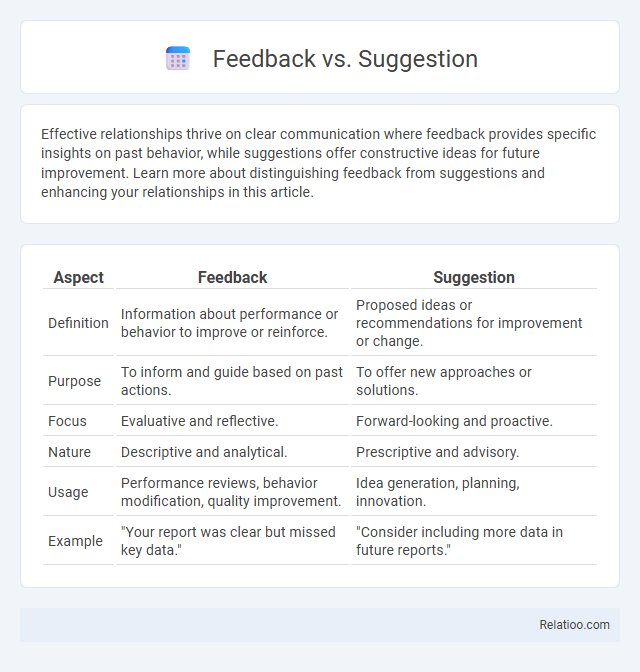Effective relationships thrive on clear communication where feedback provides specific insights on past behavior, while suggestions offer constructive ideas for future improvement. Learn more about distinguishing feedback from suggestions and enhancing your relationships in this article.
Table of Comparison
| Aspect | Feedback | Suggestion |
|---|---|---|
| Definition | Information about performance or behavior to improve or reinforce. | Proposed ideas or recommendations for improvement or change. |
| Purpose | To inform and guide based on past actions. | To offer new approaches or solutions. |
| Focus | Evaluative and reflective. | Forward-looking and proactive. |
| Nature | Descriptive and analytical. | Prescriptive and advisory. |
| Usage | Performance reviews, behavior modification, quality improvement. | Idea generation, planning, innovation. |
| Example | "Your report was clear but missed key data." | "Consider including more data in future reports." |
Understanding Feedback: Definition and Purpose
Feedback is information provided to help you understand your performance or behavior, enabling growth and improvement through specific observations. Suggestion involves offering ideas or advice aimed at guiding future actions, often encouraging creative solutions or alternative approaches. Understanding feedback's purpose centers on constructive evaluation that highlights strengths and areas needing development for personal or professional advancement.
What Constitutes a Suggestion?
A suggestion involves proposing a specific idea or course of action aimed at improvement or change, distinct from general feedback which primarily assesses performance or outcomes. Suggestions are forward-looking and solution-oriented, often coupled with reasoning or benefits to justify the recommendation. Understanding the nature of a suggestion helps in effectively implementing practical improvements and fostering innovation.
Key Differences Between Feedback and Suggestion
Feedback involves evaluating past performance or behavior to provide constructive criticism aimed at improvement, while suggestions focus on offering ideas or recommendations for future actions or changes. Feedback is typically more specific and evaluative, targeting what was done well or poorly, whereas suggestions propose alternative methods or solutions without necessarily assessing past performance. Understanding these differences helps in choosing the right communication approach for performance reviews or collaborative decision-making.
The Importance of Feedback in Personal and Professional Growth
Feedback provides specific, actionable insights that help identify strengths and areas for improvement, driving personal and professional growth effectively. Suggestions offer ideas or recommendations but may lack the critical analysis necessary for meaningful development. Emphasizing feedback fosters self-awareness, enhances skills, and promotes continuous learning, making it essential for achieving long-term success.
How Suggestions Drive Innovation and Improvement
Suggestions provide actionable ideas that spark innovation and continuous improvement by encouraging fresh perspectives and creative solutions. Unlike feedback, which primarily evaluates past performance, your suggestions proactively shape future outcomes and processes. Embracing suggestions empowers organizations to adapt and evolve, fostering a culture of growth and advancement.
Types of Feedback and Their Impact
Feedback encompasses various types such as positive, constructive, and negative, each influencing performance and motivation differently. Suggestions offer specific ideas or recommendations aimed at improvement, often fostering collaborative problem-solving. Your ability to distinguish between feedback types and utilize suggestions effectively can significantly enhance communication and growth outcomes.
Effective Ways to Give Constructive Suggestions
Effective ways to give constructive suggestions involve clear, specific, and actionable language that focuses on improvement rather than criticism. Feedback provides observations on past performance, while suggestions offer proactive ideas for future enhancements; framing suggestions positively encourages receptiveness and fosters collaboration. Prioritizing empathy and context ensures that the recipient understands the intent, making the advice more impactful and motivating meaningful change.
When to Offer Feedback vs. Suggestion
Offer feedback when the goal is to evaluate performance or behavior based on specific criteria, helping individuals understand strengths and areas for improvement. Suggestions are best provided when proposing alternative approaches or ideas that can enhance processes or outcomes without the imperative tone of feedback. Choose feedback during formal reviews or corrective scenarios, and opt for suggestions in collaborative settings or brainstorming sessions where innovation and flexibility are encouraged.
Common Mistakes in Giving Feedback and Suggestions
Common mistakes in giving feedback and suggestions include providing vague or overly general comments that lack actionable details, which can confuse the recipient and hinder improvement. Another frequent error is mixing feedback with suggestions without clear distinction, leading to misinterpretation of critiques as optional advice rather than necessary changes. Failing to balance positive and constructive points results in demoralizing criticism or ineffective encouragement, reducing the overall impact of communication.
Best Practices for Receiving Feedback and Suggestions
Effective reception of feedback involves actively listening, clarifying the points made, and expressing appreciation for the input to foster open communication. Best practices for receiving suggestions include evaluating their relevance and feasibility before implementation, ensuring alignment with organizational goals and continuous improvement objectives. Distinguishing between feedback, which often highlights performance issues, and suggestions, which propose improvements, helps in prioritizing actions and enhancing overall productivity.

Infographic: Feedback vs Suggestion
 relatioo.com
relatioo.com